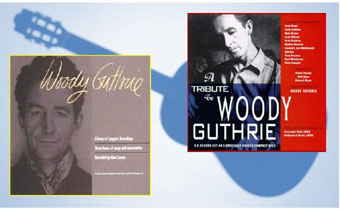
The Fiery Radical Patriot
By Earl H. Perkins | published Thursday, December 19, 2013 |
Thursday Review Associate Editor
He wrote fiery songs and was a fiery performer, so it was slightly ironic that fire was a big part of Woody Guthrie's life.
Woody Guthrie was born in Okemah, Oklahoma, in 1912. His father, Charles, was an industrious businessman, extremely active in Oklahoma politics and the revived Ku Klux Klan, which, a year or two before Woody’s birth, may have been involved in vigilante lynchings. Okemah, in the heart of the Sooner State, became a thriving oil boom town in 1920, but went bust a few years later. Guthrie and his mother, Nora, had Huntington's disease, and there were numerous fires throughout his life, some explainable and others not.
The first fire involved a shattered kerosene lamp, which consumed his beloved older sister, Clara, just short of Woody's seventh birthday. Fire No. 2 claimed the family's nice home, forcing them to move to another, less wonderful structure. There were several other unexplained blazes, and when Woody was 14, Nora heaved a kerosene lantern at a sleeping Charlie, who was severely burned on his arm.
Guthrie came of age during the Dust Bowl era of the Great Depression, and travelling with migrant workers from Oklahoma to California, he learned their traditional folk and blues songs. He was an avowed communist, but all the communist parties refused to claim Guthrie as one of their own.
The final fire came in Woody's later years when he splashed gasoline on a Florida campfire. The ensuing flames flared up and severely burned his right arm, leaving him unable to play his guitar. His greatest creative years lasted less than nine, with him entering the hospital for the last time at 54. He'd traveled Route 66 so many times he supposed he'd gone 6,666 miles in just a few short years.
The people of Guthrie's hometown of Okemah turned their back on him for several decades because of their conservatism and his lack thereof, but recent inroads have been made to rebuild his 1860s era boyhood home. An influx of tourist dollars is desperately needed for the town of 3300, according to the Associated Press.
"If you were to put a Mount Rushmore of American music here in the Midwest, the first two artists on it would be Hank Williams and Woody Guthrie," said Johnny Buschardt, a spokesman for the project. "Without Woody, there wouldn't be a Bob Dylan or a Bruce Springsteen."
His name was rarely spoken for decades, but Guthrie's family and area residents have put the past behind them. A music festival honoring him draws thousands to the hamlet annually. A large mural is now a part of the Okemah downtown, a colorful depiction which includes Guthrie and images of native American culture and history.
"When I was going to school (in the 1960s), it was almost like his name wasn't supposed to be mentioned. And when it was brought up in class, the teacher would change the subject," said resident Ric Denny, whose family has lived in the area since the 1920s.
"When I was going to school (in the 1960s), it was almost like his name wasn't supposed to be mentioned. And when it was brought up in class, the teacher would change the subject," said resident Ric Denny, whose family has lived in the area since the 1920s.
Indifference and opposition have dogged all efforts to recognize Guthrie's impact on America, and Okfuskee County History Center board member Ron Gott is glad to see attitudes changing.
"In the early 1970s and '80s, Woody was still a bad name among some residents," he said. "You had some old-timers here in Okemah who were just against Woody, but there's maybe a handful still alive."
He says the town is coming around, and that most people now understand the home is a draw, and something that's an important part of history. Other parts of Oklahoma are also honoring Guthrie, with Tulsa building a 12,000-square-foot museum honoring him, along with a park across the street named Guthrie Green.
You don't have to agree with Guthrie's politics to appreciate his skills as a singer-songwriter and folk musician, having penned hundreds of political, traditional and children's songs, ballads and improvised works. Many of his finer works were compiled on Smithsonian Folkways Recordings, which he was paid to write and compile songs symbolizing Americana. Other incredible recordings can be garnered through Vanguard, Rounder Records, Purple Pyramid, UNI/MCA and Woody Guthrie Publications. Others have been re-recorded and preserved by the Library of Congress in a massive set of songs; collectible and vintage versions on vinyl for as much as $200, and CDs for a little as $18.99.
If you're looking for a history lesson on the first half of the 1900s, then studying the life of Woody Guthrie would be a good start. PBS recently rolled out an American Masters retrospective that is must viewing for any Guthrie fan.
